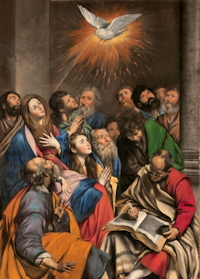Easter: May 27th
Pentecost Sunday
Other Titles: Whitsunday; Pinkster Sunday
» Enjoy our Liturgical Seasons series of e-books!
"And when the days of Pentecost were drawing to a close, they were all together in one place. And suddenly there came a sound from heaven, as of a violent wind coming, and it filled the whole house where they were sitting. And there appeared to them parted tongues as of fire, which settled upon each of them. And they were all filled with the Holy Spirit and began to speak in foreign tongues, even as the Holy Spirit prompted them to speak" (Acts 2, 1-4).
Pentecost Sunday marks the end of the first novena. See The Novena to the Holy Spirit to prepare for this great feast.
Pentecost (Whitsunday), with Christmas and Easter, ranks among the great feasts of Christianity. It commemorates not only the descent of the Holy Spirit upon the Apostles and Disciples, but also the fruits and effects of that event: the completion of the work of redemption, the fullness of grace for the Church and its children, and the gift of faith for all nations.
Pentecost
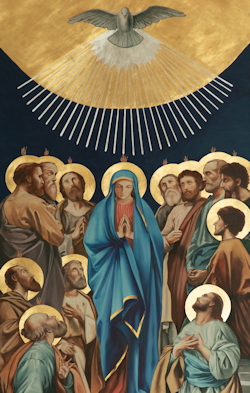 After Jesus had ascended to heaven from Mt. Olivet, the apostles and disciples returned to the Holy City. They remained together in the Upper Room or Cenacle, the place where Jesus had appeared to them and which may well be called the first Christian church. About a hundred and twenty persons were assembled there. They chose Matthias as an apostle in place of the unhappy Judas; they prayed and waited for the Paraclete.
After Jesus had ascended to heaven from Mt. Olivet, the apostles and disciples returned to the Holy City. They remained together in the Upper Room or Cenacle, the place where Jesus had appeared to them and which may well be called the first Christian church. About a hundred and twenty persons were assembled there. They chose Matthias as an apostle in place of the unhappy Judas; they prayed and waited for the Paraclete.
Ten days had passed, it was Sunday, the seventh Sunday after the resurrection. At about nine o'clock in the morning, as they were together praying fervently, the Holy Spirit descended upon them. Note how all the great theophanies in Christ's life occurred during the course of prayer. After His baptism, for instance, when Jesus was praying the heavens opened and the Holy Spirit descended in the form of a dove; likewise, it was during prayer at night that the transfiguration took place on Tabor. Surely too it was while Mary was praying that Gabriel delivered his message, and the Holy Spirit overshadowed her. Pentecost followed precedent. The small community of Christians had prepared themselves through prayer for the coming of the Paraclete. The same is true at Mass today, every day; through prayer we ready our souls for the advent of the Spirit.
The descent upon the apostles was internal and invisible in nature although accompanied by certain visible phenomena. There came a mighty roar, like the onrush of a violent wind. It came suddenly, from heaven; but unlike storms that strike a structure from without, this one penetrated and filled the room where the disciples were gathered. Therefore it was not a natural wind, it was a miracle peculiar to the occasion. A second visible sign consisted in tongues of fire that descended upon each one present. These fiery tongues gave visible evidence that the Holy Spirit had descended upon them.
Today at Mass, particularly at holy Communion, the power of the Holy Spirit will come down upon us; fiery tongues will not be seen, but invisible tongues of fire will not be absent. There was still another external manifestation of the Holy Spirit; the apostles and disciples were enabled to speak various languages.
After the roar of the wind many of Jerusalem's pilgrims hurried to the Cenacle. Pentecost was one of the three festivals which obliged all Jews to be present in Jerusalem. Jews from distant lands, and Jewish converts from paganism too, attended these feasts. As a result, a colorful crowd speaking a variety of languages surrounded the house. Now the apostles, who so shortly before had hid in fear behind locked doors, came forth and courageously walked among the multitude speaking to each in his native tongue. It was indeed amazing! Galileans, and multilingual?
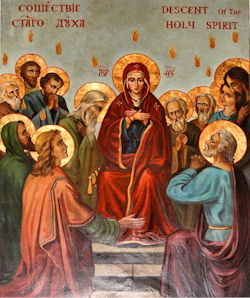 But the malicious too were present; they had the answer. Nothing marvelous at all! Those Galileans were simply drunk, and their drunken babble sounded like a foreign language! Peter showed no hesitation in answering the charge. None of their number, he said, were intoxicated; it was but nine o'clock in the morning, and at that hour men usually are sober. What the multitude saw was, in fact, the fulfillment of Joel's prophecy: In those days (of the Messiah), God will pour forth His Spirit upon men and they will prophesy. . . . Then the apostle pointed his words more directly against the accusers: they had killed Jesus, had nailed Him to the Cross; but God had awakened Him and after His departure to heaven, He sent the Holy Spirit.
But the malicious too were present; they had the answer. Nothing marvelous at all! Those Galileans were simply drunk, and their drunken babble sounded like a foreign language! Peter showed no hesitation in answering the charge. None of their number, he said, were intoxicated; it was but nine o'clock in the morning, and at that hour men usually are sober. What the multitude saw was, in fact, the fulfillment of Joel's prophecy: In those days (of the Messiah), God will pour forth His Spirit upon men and they will prophesy. . . . Then the apostle pointed his words more directly against the accusers: they had killed Jesus, had nailed Him to the Cross; but God had awakened Him and after His departure to heaven, He sent the Holy Spirit.
The pilgrims who had heard Peter give this first pentecostal sermon "were pierced to the heart and said: Brethren, what shall we do? But Peter said to them: Repent and be baptized; and you will receive the gift of the Holy Spirit." Three thousand responded.
One final question: why the miracle of tongues? In answer, recall the story regarding the tower of Babel. Puffed up by pride, men attempted to build a tower that would touch the heavens. To punish their sin, God confused their speech. Sin causes confusion and division. Now Christ came to gather all men into His Church and thereby to unite them to Himself. This should result in creating but one family of nations again. To this blessed state the miracle of tongues points.
Yes, even we as individuals have a gift of tongues which all men can understand. It is the gift of love infused into us by the Holy Spirit. Love unites, love is a common language, by means of love we can speak to all nations.
—Excerpted from The Church's Year of Grace, Pius Parsch
Meditaton: Pentecost
But I tell you the truth; it is expedient to you that I go; for if I go not, the Paraclete will not come to you; but if I go, I will send Him to you" (John 16:7). When Christ ascended into heaven, He went to His Father. Today He fulfills His promise of sending to His apostles and to His Church the Paraclete, the Holy Spirit. This coming is further proof that He has been glorified and that He sits at the right hand of the Father.
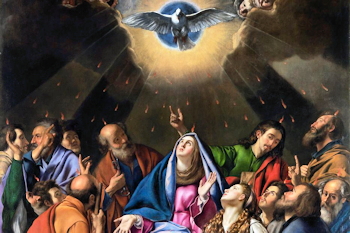 "At Christmas, God became incarnate; He came to share with us His participation in the divine life and in the grace of God. Easter is the feast of the resurrection of the soul from sin and of the incorporation of man in the mystical body of the Eucharist. Pentecost is the feast of the visible mission of the Holy Spirit to the apostles, to the Church, to each Christian family, and to each individual soul. By virtue of His death on the cross, the Lord has merited the grace of the sending of the Holy Spirit. Now that He is in heaven He prays for and effects the coming of the Holy Spirit, that we may grow in grace and holiness, that we may be strong and firm in faith, that we may reach perfection and share in the inheritance of Christ our head.
"At Christmas, God became incarnate; He came to share with us His participation in the divine life and in the grace of God. Easter is the feast of the resurrection of the soul from sin and of the incorporation of man in the mystical body of the Eucharist. Pentecost is the feast of the visible mission of the Holy Spirit to the apostles, to the Church, to each Christian family, and to each individual soul. By virtue of His death on the cross, the Lord has merited the grace of the sending of the Holy Spirit. Now that He is in heaven He prays for and effects the coming of the Holy Spirit, that we may grow in grace and holiness, that we may be strong and firm in faith, that we may reach perfection and share in the inheritance of Christ our head.
During His life on earth, and even in His mortal human body, Christ possessed the fulness of the Holy Spirit. But after His resurrection and ascension into heaven He is so completely united to and informed by the Holy Spirit that St. Paul speaks of Him as being made into a "quickening spirit" (1 Cor 15:45). Since we are His members He lives and works in us to the extent that the Holy Spirit lives and works in Him. Thus, for St. Paul "to live in Christ" means the same as "to live in the Spirit." "Baptism in Christ is baptism in the Spirit." For this reason St. John can say, "In this we know that we abide in Him and He in us; because He hath given us of His Spirit" (John 4:13).
We have been elevated to the divine life by Christ, but the Holy Spirit also took part in this operation. Where the Holy Spirit is not operating, there can be no body of Christ. "The faithful become members of the body of Christ when they attain life through the Spirit of Christ," the Holy Spirit (St. Augustine). The divine life is always given through Christ, the incarnate God. When we allow Him to do so, He always sends us the Holy Spirit, the Spirit of love. This Spirit always binds us again firmly to the Father, so that we long and strive with all our strength to be true children of the Father and to attain to perfect love. Therefore the life of Christ which was implanted in our souls by baptism (Easter) cannot be made perfect without the coming of the Holy Spirit (Pentecost).
Pentecost is the complement and the completion of Easter. Easter gives us the beginning of supernatural life and incorporation in Christ. But this new life must unfold; it must be strengthened and enkindled into a burning fire which can resist all things; it must be imbued with a love which is stronger than death, so that we are prepared to suffer all things Christ, even the sacrifice of our life. This strengthening of our spirit is brought about by our baptism with the Holy Spirit at Pentecost. The spirit of Pentecost is the spirit that makes the confessors and martyrs. It gives light, power, and unconquerable strength. This effect is visible in the apostles, who "went from the presence of the council, rejoicing that they were accounted worthy to suffer reproach for the name of Jesus" (Acts 5:41).
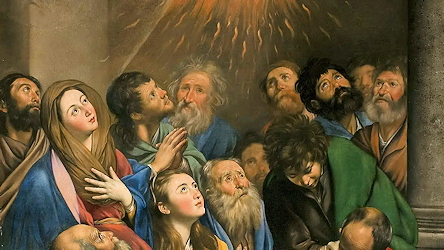 Pentecost is the birthday of the Church and of Christianity, the beginning of the New Dispensation. Man, having been touched by the Spirit, no longer lives according to the flesh, according to the principles and ideals of fallen human nature; he lives in the Spirit. He is filled with the light of truth and is guided by the Spirit of truth Himself, the Holy Spirit. The new generation of men now sees all things in their proper place in the plan of divine providence and in their relationship to eternity. In the spirit of truth and love the new generation is called to act for good and upright motives, to do only what is pleasing to the Father. It is a generation of spiritual men. Since they "live in the spirit," they must also "walk in the spirit" (Gal 5:25). They belong to Christ, and with Him they are not envious of one another, but practice mildness, patience, and charity (Gal. 5:26f.). "The fruit of the spirit is charity, joy, peace, patience, benignity, goodness, longanimity, mildness, faith, modesty, continency, chastity" (Gal 5:22f).
Pentecost is the birthday of the Church and of Christianity, the beginning of the New Dispensation. Man, having been touched by the Spirit, no longer lives according to the flesh, according to the principles and ideals of fallen human nature; he lives in the Spirit. He is filled with the light of truth and is guided by the Spirit of truth Himself, the Holy Spirit. The new generation of men now sees all things in their proper place in the plan of divine providence and in their relationship to eternity. In the spirit of truth and love the new generation is called to act for good and upright motives, to do only what is pleasing to the Father. It is a generation of spiritual men. Since they "live in the spirit," they must also "walk in the spirit" (Gal 5:25). They belong to Christ, and with Him they are not envious of one another, but practice mildness, patience, and charity (Gal. 5:26f.). "The fruit of the spirit is charity, joy, peace, patience, benignity, goodness, longanimity, mildness, faith, modesty, continency, chastity" (Gal 5:22f).
In the baptism of the Spirit, which the Church receives at Pentecost, she is washed clean in the blood of Christ; she arises with Him; she is imbued with the fullness of new life. Today she stands with the divine dowry which Christ earned for her and gave to her. She is bright with the glory of eternal youth and fertility as she stands at the side of her heavenly bride-groom. Now she has been prepared for that arduous life for which she is destined upon earth. She has been prepared to share the life of her bridegroom and to remain faithful to Him in spite of all that may befall her; she is prepared to represent Him under all circumstances, and joyfully to bring forth new generations of children. The Holy Spirit, the Spirit of love and truth, dwells within her and operates in her. He is the soul of the body of the Church. He guides her and leads her to her eternal nuptials with her divine spouse, Jesus Christ. That is the meaning of the mission of the Holy Spirit and of the feast of Pentecost.
The feast of Pentecost is a day of thanksgiving for the foundation of the Church, in which are contained all the treasures of supernatural riches, and through which all grace and redemption are given to men. Pentecost is a day of thanksgiving for the coming of the Holy Spirit and for the establishment of the sacrament of confirmation. It is a day on which we place a joyful and grateful trust in the operation of the Holy Spirit within us, and thank Him for His inspiration and guidance. On this day we again place ourselves in the hands of the Holy Spirit with complete confidence. He should be the soul of our souls; He should reign in us, amid the ruins of our own fallen nature. Pentecost is a day of petition, a day on which we should implore the Holy Spirit for a full measure of His graces and gifts. With the Church we pray:
Come, Thou Holy Spirit, come,
And from Thy celestial home
Send Thy light and brilliancy.
Come, Thou father of the poor,
Come, Thou source of gifts secure,
Come, our hearts, true radiancy.
Thou, of all consolers best,
Thou, the soul's most welcome guest,
Sweet refreshment constantly.
In our labor, rest most sweet,
Grateful coolness in the heat,
Solace in adversity.
O Thou light most pure and blest,
Shine within the inmost breast
Of Thy faithful company.
Lacking Thy divinity
Nothing good in man can be,
Nothing but iniquity.
What is sordid, make Thou pure,
What is wounded, do Thou cure,
Slake now our aridity.
What is rigid, gently bend;
What is frigid, warmly tend,
Strengthen what goes erringly.
Fill Thy faithful who confide
In Thy power to guard and guide,
With Thy sevenfold mystery.
Give them virtue's sure reward,
Give them Thy salvation, Lord,
Give eternal felicity. Amen.
—Benedict Bauer, O.S.B, from The Light of the World, Vol II, Pentecost
Highlights and Things to Do:
- Listen to the Catholic Culture audiobook St. Thomas Aquinas—Send Out Your Spirit read by James Majewski.
- Meditate on Fr. Roger Landry's homily for Pentecost Sunday.
- Pray the Golden Sequence, Veni, Sancte Spiritus which is read or sung at the Pentecost Vigil and Sunday Mass.
- Find some ideas for celebrating Pentecost in the home:
- Therese Mueller, Celebrating Pentecost in the Home
- P. Craig Stewart and Helen McLoughlin, Whitsunday, The Cenacle and The Cenacle Project.
- Ethel Marbach, Pentecost Activities and Pentecost Wheel
- Helen McLoughlin, Pentecost Visual Display
- Jan Wilson, Make Your Own Windmill
- Mary Reed Newland, Pentecost Favors, Gifts and Fruits
- Family Life Bureau, Planting a Pentecost Tree
- Pentecost Feasting Ideas: Catholic Culture has a large list of suggested recipes in the right hand column. But the themes are red, something with flames, or something that reminds of flames. Strawberry placed upside down have the shape of a flame. And also, fruits help us think of the fruits of the Holy Spirit. Another way of thinking is presenting the meal in "gift" form, like the "gifts of the Holy Spirit."
- Evelyn Vitz, Twelve Fruit Salad
- Demetria Taylor, Special Strawberry Shortcake
- Florence Berger, Pentecost Picnic and Strawberry Cake
- See also Catholic Cuisine for feast food ideas.
- For further inspiration, see the blog posts by Jennifer Gregory Miller:





